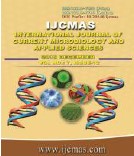


 National Academy of Agricultural Sciences (NAAS)
National Academy of Agricultural Sciences (NAAS)

|
PRINT ISSN : 2319-7692
Online ISSN : 2319-7706 Issues : 12 per year Publisher : Excellent Publishers Email : editorijcmas@gmail.com / submit@ijcmas.com Editor-in-chief: Dr.M.Prakash Index Copernicus ICV 2018: 95.39 NAAS RATING 2020: 5.38 |
Pigeonpea [Cajanus cajan (L.) Millsp.] is one of the significant grain legume crops of rainfed agriculture generally grown in sub-tropical and semi-arid regions of the world. It is having a genome size of 852Mb. The number of chromosomes is 2n =2x = 22. Pigeonpea is used as a substitute for animal protein in developing countries of subtropical and semi-arid regions. Mapping population, RIL was used for the study was derived through SSD method from the cross between H2001-4 and ICP 7035. The cross was further advanced to F6-7 generation. Parental ones were contrasting for all the characters included in the study of the plant type and seed yield components. Parents under the study were showing remarkable differences with respect to one another. ICP 7035 was a moderately resistant variety (Anita Kumari et al., 2010). ICP 7035 was a semi-compact medium duration one and show moderate resistance to pod borer, Hubner. But the H2001-4 was having indeterminate plant growth matures early. The field evaluation was carried out during Kharif, 2014-15 (Environment-1) and 2015-16 (Environment-2). Around 318 recombinant inbred lines were sown in augmented RBD design (Federer, 1956) in six blocks with parents (ICP 7035 and H2001-4). Seven checks were used for the assessing the performance of the different inbred lines which were viz., Pusa 992, Pusa 991, Pusa 2001, Pusa 2002, Pusa 2012, Pusa 855 and V114.Earliness is an important character for developing early maturing varieties. Compact semi erect and compact erect characters help for enhancing the cropping density of the Pigeonpea. Genetic parameters show that there is significant variation with in the population that was studied the descriptive statistics studied were also shows a range of variation for all the traits under study. There is significant variability in the two populations that had been studied. The difference between the GCV and PCV is less indicating the influence of the environment is less and the differences under the study will give the valuable information about the genes governing the traits of interest.
 |
 |
 |
 |
 |